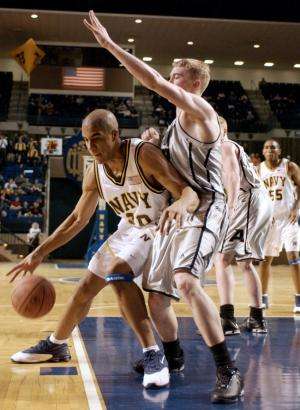May 5, 2014 report
Basketball study says cooperative play lessens during playoffs

(Phys.org) —Kids basketball is an inspiring sight, watching young players lock foreheads, touch hands, pledge teamwork, and constantly pass the ball for others to shoot and score. Now for grown-up talk. Two assistant professors have written a paper in PLOS One, titled "Selfish play increases during high-stakes NBA games and is rewarded with more lucrative contracts". The authors, Eric Uhlmann of the HEC Paris School of Management and Christopher Barnes of the Foster School of Business, University of Washington in Seattle, said that cooperative team play actually diminishes during NBA playoff games. They wrote that "players' personal prestige and financial compensation may be more closely linked to their individual scoring tally than to their contributions to points scored by teammates, a perverse incentive that could be strengthened by the increased public attention attracted by high-stakes games."
Why this is so has to do with what the authors call "a fascinating case of mixed incentives" confronting professional sports teams. Although they compete fiercely for group honors, players are rewarded financially based on evaluations of their individual performance.
Uhlmann and Barnes analyzed NBA statistics and examined player and team behavior and performance across all 30 teams from the 2004–2005 through the 2012–2013 seasons. They also examined labor contracts signed by individual NBA players following the 2003–2004 and 2004–2005 seasons. "As collecting individual salary data for every NBA player was labor-intensive we stopped after obtaining a sufficient sample (N = 131 players across two full years) to test our theoretical hypotheses regarding changes in compensation across time."
The authors also noted limiting effects of a non-cooperative strategy, scoring points for self rather than ensuring the team wins, to improve one's tally and market value as a lose-lose proposition for the team and the individual; a reputation as someone who plays for himself rather than the team "may damage a player's value in the eyes of peers, fans, and coaches. Thus, reputational concerns and costly punishment by teammates likely circumscribe individuals' willingness to adopt noncooperative strategies."
Questions raised by their findings: Do women and members of teams outside the United States play more selfishly when the stakes get high? One can argue that "collectivist" cultures might not have such conflicts between personal and team incentives.
The authors said it was possible that "players in nations such as China, Japan, and India may not reduce their backing-up behavior during important games. Also, that women are more relationally oriented than men suggests that even within the United States, high-stakes games in women's sports leagues may not be associated with diminished levels of team cooperation."
Another important question for research, they said, is whether money does all the talking. Are players motivated by money only or is money a proxy for more intangible rewards, such as public acclaim and prestige?
"Regardless of whether the rewards of noncooperative play are primarily material or psychological, our analyses make it clear such behavior is especially likely in high-stakes games and is rewarded by increases in individual level financial compensation.".
More information: Uhlmann EL, Barnes CM (2014) Selfish Play Increases during High-Stakes NBA Games and Is Rewarded with More Lucrative Contracts. PLoS ONE 9(4): e95745. DOI: 10.1371/journal.pone.0095745
Journal information: PLoS ONE
© 2014 Phys.org

















